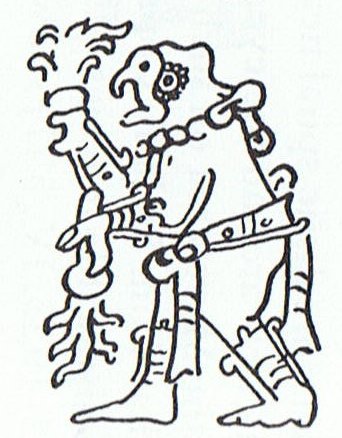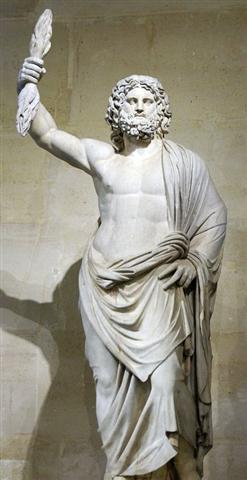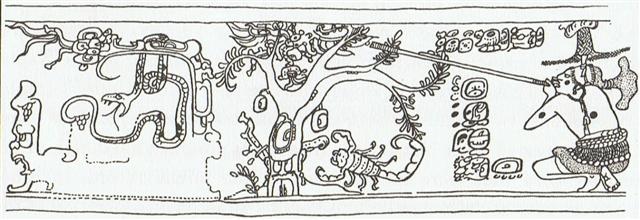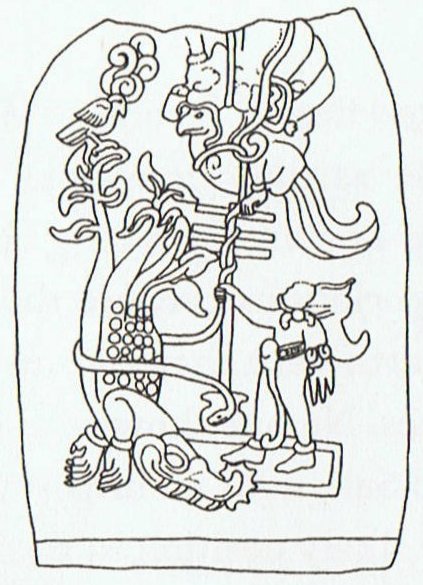The ancient pattern with Jupiter entering the First Point of the Capricorn (ξ) in NOVEMBER 17 (321) could in rongorongo times have been reused as a pattern where the Full Moon was reaching MARCH 16 (*360) and the Sun was rising with Vrischika in November 17 (*241):
| NOVEMBER 14 |
15 |
16 (320) |
17 |
18 (*242) |
 |
 |
 |
 |
 |
| Gb1-9 |
Gb1-10 |
Gb1-11 (240) |
Gb1-12 |
Gb1-13 |
| ε Pavonis, θ Sagittarii (302.3), γ Sagittae (302.5), μ Pavonis (302.7 |
τ Aquilae (303.8) |
20h (304.4) |
SHANG WEI (Higher Guard) = κ Cephei (305.2), θ Sagittae (305.4), TSEEN FOO (Heavenly Raft) = θ Aquilae (Ant.) (305.6), ξ Capricorni (305.8) |
TSO KE (Left Flag) = ρ Aquilae (306.3) |
| η Sagittae (304.2), δ Pavonis (304.4) |
| January 17 |
18 (383) |
19 (*304) |
20 |
21 |
| °January 13 |
14 |
15 |
16 (*301) |
17 (382) |
| SOLSTICE |
'December 22 |
23 (*277) |
CHRISTMAS EVE |
25 (359) |
| "December 7 |
8 |
9 |
10 (*264) |
11 (345) |
| SEPTEMBER 12 |
13 (256) |
14 (182 + 75) |
15 |
16 |
17 (*180) |
 |
 |
no glyph |
 |
 |
 |
| Kb4-18 (163 + 8) |
Kb4-19 (172) |
*Kb5-2 |
*Kb5-3 (175) |
*Kb5-4 |
| κ Serpentis (239.3), δ Cor. Borealis, TIĀNRŪ = μ Serpentis (239.5), χ Lupi, (239.6), ω Serpentis (239.7), BA = ε Serpentis, χ Herculis (239.8). κ Cor. Borealis, ρ Serpentis (239.9) |
β Tr. Austr. (240.3), κ Tr. Austr. (240.4), ρ Scorpii (240.8) |
Iklīl al Jabhah-15 / Anuradha-17 / Room-4 |
υ Herculis (242.3), ρ Cor. Borealis (242.4), ι Cor. Borealis (242.5), θ Draconis (242.6), ξ Scorpii (242.7)
SCHEDIR (α Cassiopeiae)
|
16h (243.5) |
ψ Scorpii (244.6), LESATH = ν Scorpii (244.8) |
| ξ Lupi, λ Cor. Bor.(241.1), ZHENG = γ Serpentis (241.2), VRISCHIKA = π Scorpii (241.3), ε Cor. Borealis (241.5), DSCHUBBA = δ Scorpii (241.7), η Lupi (241.9) |
ACRAB = β Scorpii, JABHAT AL ACRAB = ω Scorpii (243.3), θ Lupi, RUTILICUS = β Herculis (243.5), MARFIK = κ Herculis (243.7), φ Herculis (243.8) |
| November 15 |
16 (320) |
17 |
18 (*242) |
19 |
20 (324) |
| °November 11 |
12 (*236) |
13 |
14 (318) |
15 |
16 (320) |
| 'October 19 |
20 |
21 (*214) |
22 (295) |
23 |
24 |
| "October 5 |
6 (*199) |
7 (280) |
8 |
9 |
10 |
| NAKSHATRA DATES: |
| 3-14 (73) |
MARCH 15 |
16 (*360) |
17 |
18 (442) |
19 (78) |
| MENKHIB = ζ Persei (57.6)
PORRIMA (γ Virginis)
|
ε Persei (58.5), ξ Persei (58.5), ZAURAK = γ Eridani (58.9) |
λ Tauri (59.3), ν Tauri (59.9) |
4h (60.9) |
υ Persei (61.2) |
BEID = ο¹ Eridani (62.2), μ Persei (62.8)
VINDEMIATRIX ( ε Virginis)
|
| JĪSHUĬ = λ Persei (60.7)
COR CAROLI (α Canum Ven.)
|
| May 17 |
18 |
19 |
20 (140) |
21 (*61) |
22 |
| °May 13 |
14 |
15 (500) |
16 (136) |
17 (*57) |
18 |
| 'April 20 |
21 (111) |
22 (*32) |
23 (478) |
24 (*399) |
25 (*400) |
| "April 6 |
7 |
8 (*383) |
9 (464) |
10 (100) |
11 (101) |
*241 (NOVEMBER 17) - *177 (SEPTEMBER 14) = *64, i.e. equal to the number of precessional days down to the time of Hyadum II.
And then we must consider the vainglorious Seven-Macaw who thought he was the Sun, but whose beautiful shining tooth was broken (koti, hati, gaa, motu, mutu):
 
| Koti Kotikoti. To cut with scissors (since this is an old word and scissors do not seem to have existed, it must mean something of the kind). Vanaga.
Kotikoti. To tear; kokoti, to cut, to chop, to hew, to cleave, to assassinate, to amputate, to scar, to notch, to carve, to use a knife, to cut off, to lop, to gash, to mow, to saw; kokotiga kore, indivisible; kokotihaga, cutting, gash furrow. P Pau.: koti, to chop. Mgv.: kotikoti, to cut, to cut into bands or slices; kokoti, to cut, to saw; akakotikoti, a ray, a streak, a stripe, to make bars. Mq.: koti, oti, to cut, to divide. Ta.: oóti, to cut, to carve; otióti, to cut fine. Churchill.
Pau.: Koti, to gush, to spout. Ta.: oti, to rebound, to fall back. Kotika, cape, headland. Ta.: otiá, boundary, limit. Churchill. |
| Hati
Hati 1. To break (v.t., v.i.); figuratively: he hati te pou oka, to die, of a hopu manu in the exercise of his office (en route from Motu Nui to Orongo). 2. Closing word of certain songs. Vanaga.
Hahati. 1. To break (see hati). 2. Roughly treated, broken (from physical exertion: ku hahati á te hakari) 3. To take to the sea: he hahati te vaka. Vanaga.
Ha(ha)ti. To strike, to break, to peel off bark; slip, cutting, breaking, flow, wave (aati, ati, hahati); tai hati, breakers, surf; tumu hatihati, weak in the legs; hakahati, to persuade; hatipu, slate. P Pau.: fati, to break. Mgv.: ati, hati, to break, to smash. Mq.: fati, hati, id. Ta.: fati, to rupture, to break, to conquer. Churchill. |
| Gaa Gaaha, to burst, to become ruptured, to have a discharge of pus, of blood. Ku gaaha te toto o te ihu. He had a nose-bleed. E û'i koe o gaaha te îpu. Be careful not to break the bottle (lit. look out lest the bottle burst). E tiaki á au mo gaaha mai o te harakea. I shall wait for the abcess to burst. Gaatu, totora reed. Vanaga.
To break, to split, to crack, to rive; fracture, fissure, break, crack, crevice (gaaha); niho gaa, toothache, broken teeth; gaamiro (miro, ship) shipwreck; gaàpu (pu 2), abortion; poki gaàpu, abortive child. T Mq.: naha, nafa, split, fissure. Ta.: aha, afa, crack fissure. Gaatu 1. Bulrush, reed. 2. (gatu). Churchill. |
| Motu 1. To cut; to snap off: motu-á te hau, the fishing line snapped off; to engrave, to inscribe letters or pictures in stone or in wood, like the motu mo rogorogo, inscriptions for recitation in lines called kohau. 2. Islet; some names of islets: Motu Motiro Hiva, Sala y Gómez; and around the island: Motu Nui, Motu Iti, Motu Kaokao, Motu Tapu, Motu Marotiri, Motu Kau, Motu Tavake, Motu Tautara, Motu Ko Hepa Ko Maihori, Motu Hava. Motu rau uri, southeast wind. Motu takarua, west wind. Vanaga.
To break, to cut with a knife, to sever, to rupture; rent, reef, shoal, rock; motu poto, to cut short; aretare motu, an oratory; motu kivakiva, an uncovered shoal; motumotu, to cut up; tae motumotu, e ko motumotu, indissoluble. P Pau.: motu, island; komutu, to break. Mgv.: motu, an island, a rock, to cut, to be broken. Mq.: motu, island, land, to break, to cut up, to take to pieces. Ta.: motu, a low island, to be broken, cut up. Motuava (motu - ava 1), a hollowed rock. Motuhaua, archipelago. Motupiri (motu - piri), archipelago. Motuputuputu (motu - putuputu), archipelago. Moturauri, south wind T. Moturogorogo, to write T. Churchill.
H Moku 1. To be cut, severed, amputated, broken in two, as a rope; broken loose, as a stream after heavy rains, or as a bound person; to punctuate. Moku ka pawa, dawn has broken. Kai moku ka noho 'ana, relations separated by the sea. Ho'o moku, to cut and divide; a cutting, division, separation. 2. District, island, islet, section, forest, grove, clump, severed portion, fragment, cut, laceration, scene in a play. Cfr. mokupuni, momoku. Moku lehua, lehua forest. Ho'o moku, to place one over a moku, district. 3. Ship, schooner, vessel, boat, said to be so called because the first European ships suggested islands. 4. A stage of pounded poi (such poi sticks together as a mass and can be separated cleanly - moku - from the pounding board). Wehewehe. |
| Mutu 1. Cut short, shortened, amputated; at an end, ceased; anything cut off short; short, brief, quick (rare). Ua muku ko'u lole, my dress is shortened. He kanaka wāwae muku, a person with amputated foot. Huli muku a'ela nā wa'a, the canoes turned sharply. (PPN mutu.) 2. A measure of length from fingertips of one hand to the elbow of the other arm, when both arms are extended to the side. 3. Broken section of a wave or crest. See lala 1. 4. Same as Mumuku, a wind. 5. Thirtieth night of the moon, when it has entirely disappeared (muku). 6. Starboard ends of 'iako (outrigger booms), hence starboard sides of a canoe. Wehewehe. |
Seven-Macaw (Itzam-Yeh) could have been Jupiter, or a similar figure in the previous creation:

... This pot depicts one of the Hero Twins (One-Ahaw in the Classic texts and One-Hunaphu in the K'iche' Popol Vuh) and a great bird who is trying to land in a huge ceiba tree heavy with fruit. This mythical bird is Itzam-Yeh, Classic prototype of Wuqub-Kaqix, 'Seven-Macaw', of Popol Vuh fame. In that story, in the time before the sky was lifted up to make room for the light, the vainglorious Seven-Macaw imagined himself to be the sun. Offended by his pride, the Hero Twins humbled him by breaking his beautiful shining tooth with a pellet from their blowgun. This pot shows One-Ahaw aiming at the bird as he swoops down to land in his tree. As Itzam-Yeh lands on his perch, the text tells us he is 'entering or becoming the sky'.
This particular 'sky-entering' is not the one mentioned in the Palenque text. It is the final event that occurred in the previous creation before the universe was remade. Before the sky could be raised and the real sun revealed in all its splendor, the Hero Twins had to put the false sun, Itzam-Yeh, in his place. If the date on this pot corresponds to that pre-Columbian event, as we believe it does, then Itzam-Yeh was defeated on 12.18.4.5.0 1 Ahaw 3 K'ank'in (May 28, 3149 B.C.).
After the new universe was finally brought into existence, First Father also entered the sky by landing in the tree, just as Itzam-Yeh did ...

|









